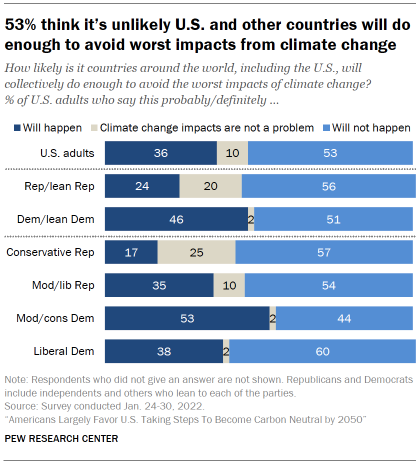For Earth Day, key facts about Americans’ views of climate change and renewable energy
Earth Day #EarthDay

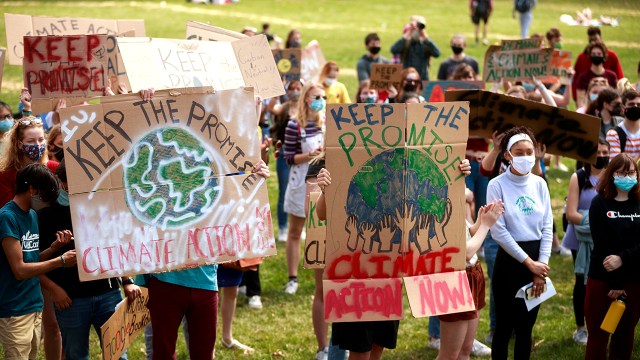 Protesters advocate for carbon neutrality during the Keep the Promise rally in Bloomington, Indiana, in March 2021. (Jeremy Hogan/SOPA Images/LightRocket via Getty Images)
Protesters advocate for carbon neutrality during the Keep the Promise rally in Bloomington, Indiana, in March 2021. (Jeremy Hogan/SOPA Images/LightRocket via Getty Images)
On April 22, people around the world commemorate Earth Day with events that call attention to a wide range of environmental concerns, especially global climate change.
To mark the occasion, here’s a look at what recent Pew Research Center surveys have found about Americans’ views on climate change and renewable energy sources.
The data for this post was drawn from multiple Pew Research Center surveys. Most findings are from a Center survey of 10,237 U.S. adults conducted from Jan. 24 to 30, 2022.
Everyone who took part in the surveys is a member of the Center’s American Trends Panel (ATP), an online survey panel that is recruited through national, random sampling of residential addresses. This allows for nearly all U.S. adults to have a chance of selection. The surveys are weighted to be representative of the U.S. adult population by gender, race, ethnicity, partisan affiliation, education and other categories. Read more about the ATP’s methodology.
About four-in-ten U.S. adults (42%) say that dealing with climate change should be a top priority for President Joe Biden and Congress to address this year, according to a Center survey conducted in January 2022. While fewer Americans rate dealing with climate change as a top priority than say the same about the other 17 issues in the survey, Democrats and those under age 30 are more likely than other Americans to view it as a top priority.
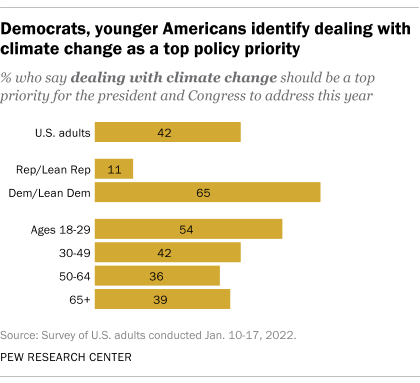
Roughly two-thirds of Democrats and independents who lean toward the Democratic Party (65%) say addressing climate change should be a top priority for Biden and Congress, compared with just 11% of Republicans and GOP leaners.
A 54% majority of adults under 30 say global climate change should be a top priority, compared with smaller shares of Americans ages 30 to 49 (42%), ages 50 to 64 (36%) and ages 65 and older (39%).
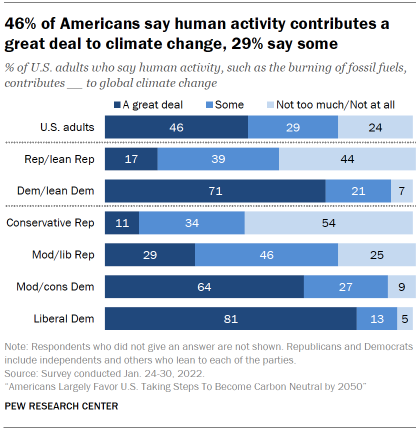
Three-quarters of Americans say that human activity, such as the burning of fossil fuels, contributes to climate change at least some, with 46% saying it contributes a great deal, a separate January 2022 Center survey found. About a quarter of Americans (24%) say the burning of fossil fuels and other human activity contributes not too much or not at all to climate change. Views on this question have held mostly steady in recent years.
Democrats and Republicans have very different views on this topic. A large majority of Democrats say human activity contributes a great deal to climate change (71%), while just 17% of Republicans say the same. Larger shares of Republicans say human activity contributes some to climate change (39%) or that it contributes not too much or not at all (44%).
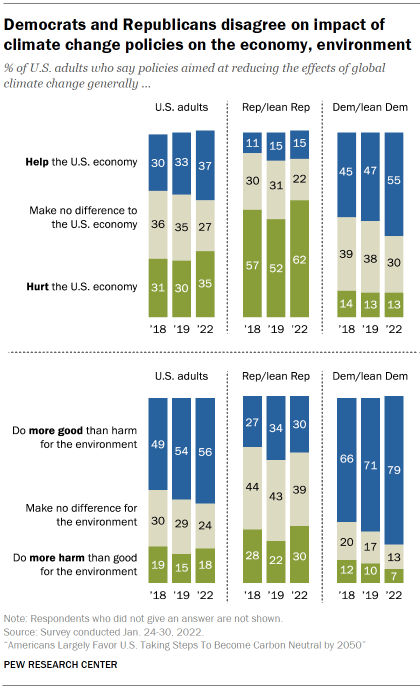
Americans generally view policies aimed at reducing the effects of global climate change as good for the environment, but are split on whether they help the economy, according to the same January 2022 survey. A slim majority of Americans (56%) say that policies aimed at addressing climate change generally do more good than harm for the environment. Just 18% say they generally do more harm, and 24% say these policies don’t make a difference for the environment.
About as many Americans say these policies generally help the U.S. economy as hurt it (37% and 35%, respectively), while 27% say they think these policies make no difference for the economy. The share of Americans saying climate policies help the U.S. economy is up 7 percentage points over the last four years, driven by more positive assessments among Democrats.
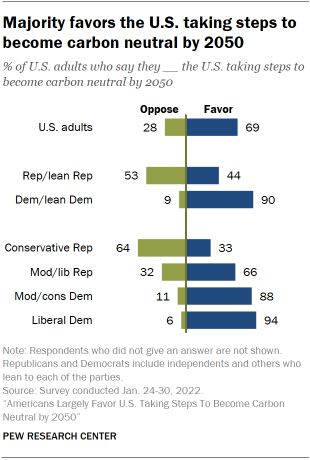
When it comes to specific policies, 69% of U.S. adults favor the United States taking steps to become carbon neutral by 2050 – that is, releasing no more carbon dioxide into the atmosphere than is removed, the January 2022 survey found. About three-in-ten Americans (28%) say they oppose this policy. Carbon neutrality has been a key component of the Biden administration’s climate and energy policy agenda.
Again, there are wide gaps among partisans. The vast majority of Democrats (90%) favor the U.S. taking steps to become carbon neutral by 2050. In contrast, slightly more than half (53%) of Republicans oppose this goal, while 44% favor it.
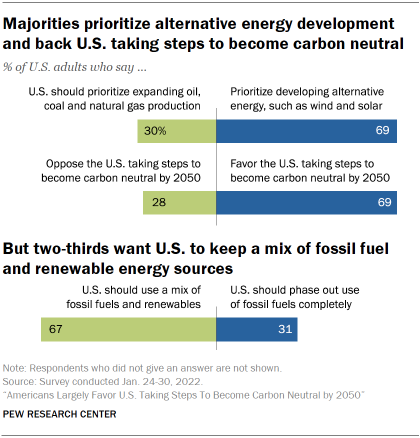
About seven-in-ten Americans (69%) prioritize developing alternative energy sources, such as wind and solar, over expanding the production of oil, coal and natural gas, according to the same survey, which was conducted prior to Russia’s invasion of Ukraine and a subsequent increase in gasoline and other energy prices. Three-in-ten Americans say expanding exploration and production of oil, coal and natural gas should be a more important priority than developing alternative energy sources.
Most Americans don’t want to see fossil fuels totally eliminated from the U.S. energy supply. Two-thirds of adults say the nation should use a mix of fossil fuels and renewable energy sources, while about a third (31%) say the country should phase out the use of oil, coal and natural gas completely.
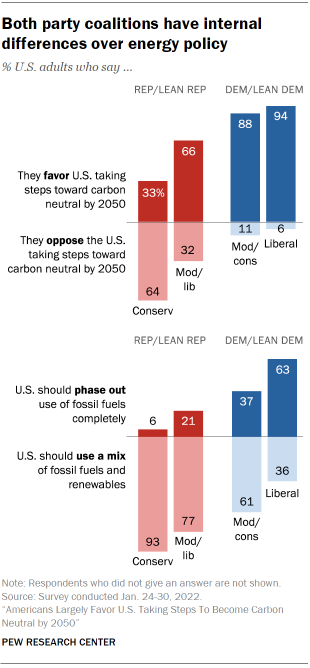
Ideological divides exist within both partisan coalitions over some energy policies, the January 2022 survey found. In the GOP, for example, a third of conservative Republicans and GOP leaners favor the U.S. taking steps to become carbon neutral, while 64% oppose it. Among moderate and liberal Republicans, by contrast, opinions are the reverse: 66% favor this goal, while 32% oppose it.
There is a similar ideological divide among Democrats when it comes to the balance between fossil fuels and renewable energy. About six-in-ten liberal Democrats (63%) say the U.S. should phase out fossil fuels completely, compared with 36% who prefer the country use a mix of fossil fuels and renewables. Among moderate and conservative Democrats, by comparison, 37% support the U.S. phasing out fossil fuels completely, compared with 61% who prefer a mix of fossil fuels and renewables.
Three-quarters of Americans support the U.S. participating in international efforts to help reduce the effects of climate change, the January 2022 survey found. About a quarter of Americans (24%) oppose this.
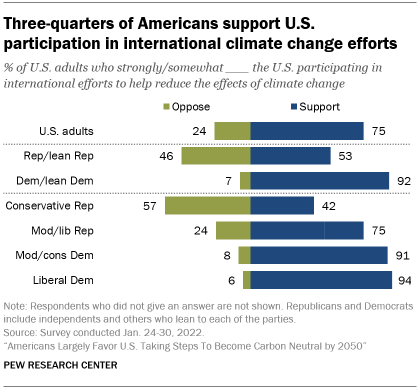
There is less consensus over whether the U.S. has a responsibility to provide financial assistance to help developing economies build renewable energy sources as part of international efforts to reduce the effects of global climate change. Around six-in-ten U.S. adults (59%) say the U.S. does not have this responsibility, while 39% say it does.
Looking ahead, around half of Americans (53%) say it’s unlikely that countries around the world, including the U.S., will collectively do enough to avoid the worst impacts from climate change, the same January survey shows. A smaller share (36%) says collective action globally will likely be enough to avoid the worst impacts from climate change, while another 10% say they don’t view climate change impacts as a problem.
